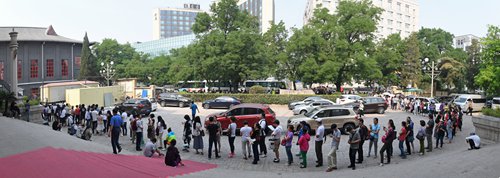
People line up outside the Beijing People's Art Theater on May 19 to buy tickets for Teahouse. (Photo/Courtesy of the Beijing People's Art Theater)
The hottest ticket in town this month is definitely Teahouse, a three-act classic that is scheduled to open on June 12 at the Beijing People's Art Theater.
According to a Beijing Evening News report from May 19, the show's 680 yuan ($100) first-class tickets sold out a half an hour after sales began. Enthusiasts had begun lining up outside the Beijing People's Art Theater starting at 3 am in the morning to wait for ticket sales to begin at 8 am, said local reports. By 3 pm, tickets for all 13 shows had sold out.
Bai Yan, a staff member from the theater's publicity office, told the Global Times on May 29 that the show has fascinated people for decades. When asked whether the play's huge popularity this year was unusual, she said, "This happens almost every time the play is shown."
For veteran fans, such as 25-year-old Tan Suwei (pseudonym), getting a ticket for the play is often "not easy."
Classic success
The play, written by Chinese literature master Lao She (1899-1966), is returning to the Beijing People's Art Theater after spending a year touring overseas.
As this year marks the theater's 65th anniversary, this production has added meaning since the play was first performed there in 1958.
Since then, the production has gone through a few changes in cast and directors. Most Chinese break the production down into two "editions," an old edition featuring lead actor Yu Shizhi (1927-2013) which ran until 1992, and the current edition with Pu Cunxin as the lead since 1999.
Tan said she and her friends developed a "special connection" with the play after they first read an excerpt in school when they were children.
"The play has always been popular," Tan told the Global Times on Friday. "But I guess people nowadays learn about it thanks to the Internet."
Set in the years from 1898 to the 1940s at a Beijing teahouse named Laoyutai, the realist masterpiece follows the ups and downs experienced by a few routine customers and workers at the teahouse as the country undergoes various changes. One of the best known Chinese stage plays, Teahouse is not only famous in China, but also made a name for itself overseas in 1980 during a tour to France, Switzerland and then West Germany.
"The script is so well-written," Wang Chengyin, a young Beijing director, told the Global Times.
"When you are sitting in the theater listening to the actors speak their lines, you feel like they are talking about things that are happening today instead of the past."
Rising popularity
Some media reports argue that Teahouse's success is not reflective of the overall theater industry in China, which has grown extremely slowly over the past few decades.
However, some say that while the long-lasting success of classic plays such as Teahouse could be considered the exception to the rule in the past, this success now represents an increasingly vibrant market for theater in China today.
Liu Zhu (pseudonym), associate manager of the award-winning drama club at Shanghai's Fudan University, told the Global Times on Thursday that based on her experiences the market is no longer as "sluggish" as many people used to think it is.
"Getting a ticket to certain plays is not easy here either," Liu said.
"Tickets to one drama festival in downtown Shanghai sold out in just a few days," she noted.
According to statistics released by the Beijing-based cultural research platform Daolue at the Beijing Performance and Arts Expo in April, audiences attending stage plays grew by 8.2 percent year-on-year in 2016 to reach a total of 5.79 million people, while ticket revenue reached 819 million yuan ($120 million), an increase of 6.8 percent over 2015.
"Plays produced by the Meng Jinghui Studio and those by Stan Lai are always the public's favorites," Liu said, mentioning Meng Jinghui, a mainland avant-garde drama director famous for black-humor hit plays such as Two Dogs' Opinions on Life, and Lai, an award-winning Taiwan drama director best known for his Secret Love in Peach Blossom Land that combines tears with laughter.
"Imported plays such as War Horse and Sleep No More are quite popular. Tickets are so hard to get that a scalped ticket for Sleep No More can cost more than 1,200 yuan, quite a bit higher than the original price," she said.
Liu noted that apart from a good script and a good director, a play's marketing strategy is also an important part of a production's success.
According to the data from Daolue, the number of works produced by mainstream theaters, such as the famous Chinese drama troupe Kaixin Mahua, grew by more than 30 percent in 2016, with ticket revenue reaching 655 million yuan. This accounts for 80 percent of total ticket revenue in the mainland market.
However, overall the total number of stage plays in 2016 dropped by 3.8 percent, due to a 17 percent decline in shows from experimental theaters, the report shows.
Li Taijia (pseudonym), a 20-something Beijing-based experimental theater fan, told the Global Times on Sunday that based on her experience at some experimental theaters, the nature of their plays, which tend to be difficult to understand, means that they have a harder time attracting new audiences outside hard-core fans of the genre.


















































